By Ruma Paul
DHAKA (Reuters) – Ethnic minorities in Bangladesh’s southern hilly area live in worry after clashes during which 4 individuals have been killed and dozens wounded, police and witnesses stated on Saturday.
Sectarian violence, sparked by the lynching of a Bengali man on Wednesday, has displaced scores of ethnic households after houses and companies have been set on hearth in Chittagong Hill Tracts (CHT) bordering Myanmar and northeast India, they stated.
A 72-hour highway and waterways blockade, known as by student-led ethnic teams, is underway in three hilly districts of Khagrachhari, Rangamati and Bandarban within the CHT, residence to a number of indigenous tribal teams.
The protesters are calling for punishment of these accountable for the unrest, which escalated on Thursday, resulting in the deaths of at the least 4 males from ethnic minorities.
Many households in Khagrachhari and Rangamati have fled, forsaking burning homes and companies.
Regardless of heavy military, police and Border Guard Bangladesh patrols, residents stay on edge.
“A tense situation is prevailing… Police and security forces are jointly patrolling, hopefully, peace will restored soon,” stated Ahsan Habib, deputy inspector basic at Chittagong Vary Police.
The Bengali man’s lynching triggered retaliatory assaults on ethnic minority communities, officers stated.
Dozens of homes and companies, primarily belonging to Buddhist minorities, have been set on hearth or attacked. Buddhist temples grew to become targets, and loudspeakers in native mosques have been used to incite Bengali mobs, witnesses stated.
In response, native authorities have imposed Part 144, a curfew-like measure, in Khagrachhari and Rangamati.
The interim authorities led by Nobel Peace Prize laureate Mohammad Yunus, which took energy after lethal protests that led to the ousting of Prime Minister Sheikh Hasina final month, has expressed deep remorse over the violence. It has instructed all safety forces to train most restraint and prioritise the protection of all residents.
A high-level committee shall be shaped to analyze the violence, Dwelling Affairs Adviser Lt Gen (Retd) Jahangir Alam Chowdhury stated after a gathering with native political leaders and varied organisations.

Within the Eighties, the federal government resettled hundreds of landless Bengali households within the 5,500 sq miles (14,200 sq km) CHT, fuelling rigidity between the brand new settlers and indigenous teams.
In 1997, the then authorities of Prime Minister Sheikh Hasina signed a peace accord with the Shanti Bahini, a tribal guerrilla group, ending a 25-year insurgency that sought political autonomy for the area.




